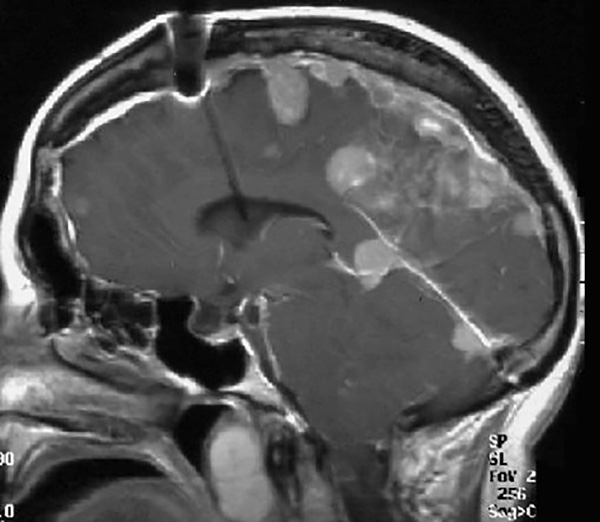New clinic treats rare neurological disorder
Washington University has the Midwest’s only multidisciplinary program specializing in treating patients with the genetic disorder neurofibromatosis type 2

Meningioma tumors in the brain of a neurofibromatosis type 2 (NF2) patient.
The Washington University Neurofibromatosis Center, in collaboration with Barnes-Jewish Hospital and the Alvin J. Siteman Cancer Center, have opened the only program in the Midwest specializing in the clinical care of patients with neurofibromatosis type 2 (NF2)—a genetic disorder affecting one in 40,000 people worldwide.
The Neurofibromatosis Center, under the direction of David Gutmann, MD, PhD, is a collective of clinicians and laboratory scientists focused on accelerating the pace of scientific discovery and its application to the care of individuals with NF. The new program adds to the center’s reach.
One of the most frustrating aspects of NF2 is its variation among individuals, even in members of the same family. In general, most individuals with NF2 experience their first symptoms— often hearing loss, ringing in the ears (tinnitus) and balance problems—during the late teenage years or early 20s.
A multidisciplinary team
Washington University neurosurgeon Michael Chicoine, MD, and Washington University otolaryngologist Timothy Hullar, MD, co-directors of the NF2 clinical program, have collective experience in treating large numbers of patients with this uncommon disease, and helped assemble a dedicated, multidisciplinary group of physicians and other health care professionals to coordinate comprehensive patient assessment and treatment.
Washington University’s extensive research facilities and clinical experience make it highly qualified to provide the specialized care required by many NF2 patients. This care includes using chemotherapy to arrest the growth of tumors or to reduce their size and providing cochlear implantation to preserve or restore hearing.






